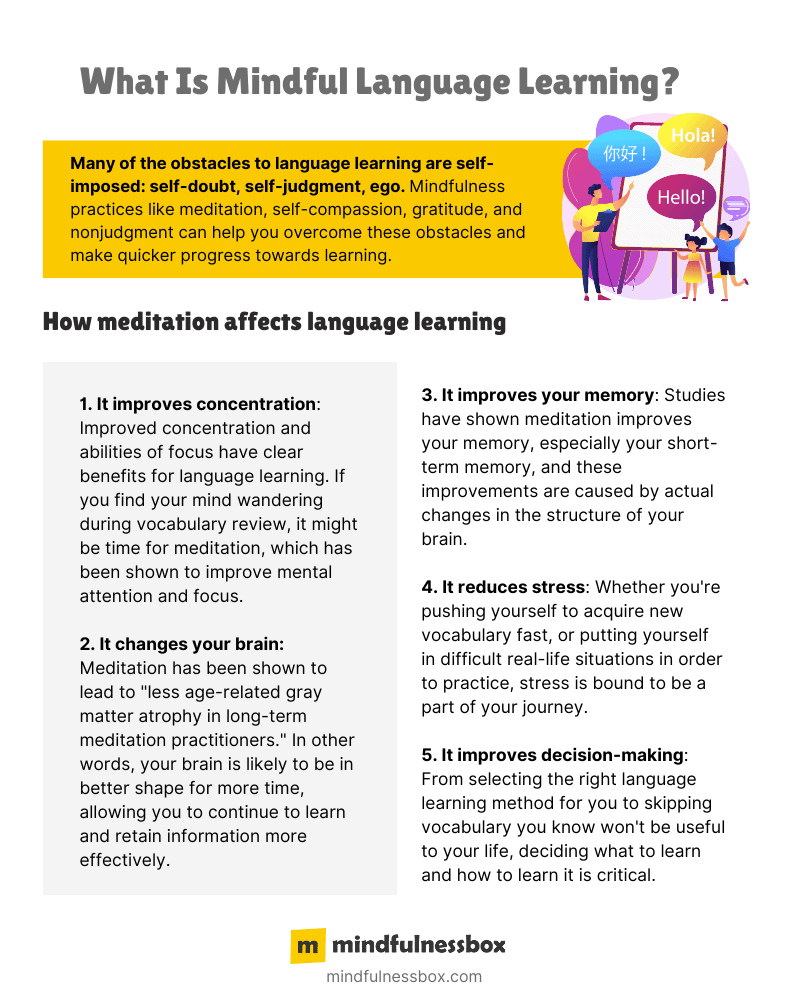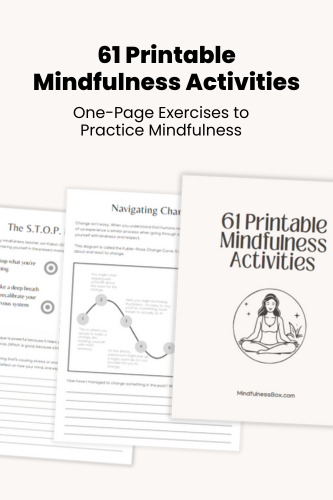How can mindfulness and language learning go hand in hand? Many of the obstacles to language learning are self-imposed: self-doubt, self-judgment, ego. Mindfulness practices like self-compassion, gratitude, and nonjudgment can help you overcome these obstacles and make quicker progress towards learning.
If you’ve hit a wall when learning a new language, there may be a solution you haven’t tried yet:
Mindfulness.
Get dozens of one-page exercises to help practice mindfulness, meditation, gratitude, and self love. Perfect for printable handouts when teaching mindfulness to groups, students, or in the workplace.
To see examples, plus a full list of the 61 exercises included, click below.
Many of the obstacles to language learning are self-imposed:
We’re afraid of looking stupid so we don’t practice, or we don’t truly believe we can learn to speak another language, or we don’t give ourselves credit for how far we’ve come.
Mindfulness practices like self-compassion, gratitude, and nonjudgment can help. Even more interesting is meditation, and its capacity to change the brain, maintain gray matter, and improve memory and focus.
Let’s discuss why mindfulness and meditation may be exactly what you need on your language learning journey—and how learning a language can improve your mindfulness practice, too.
How mindfulness can help you learn languages

Learning a new language is hard work.
Beyond the heavy lifting of understanding grammatical structures and vocabulary and conjugation, you also have a your own emotions to contend with:
Self-doubt.
Frustration.
Embarrassment.
Ego.
Any one of these can derail your language learning process, making progress almost impossible. How can you learn a new language if you aren’t able to work through your own frustration and self-doubt? How can you have a conversation if you aren’t willing to face embarrassment?
Mindfulness can help you keep your own expectations in check on your language learning journey, avoid blaming yourself for slow progress, and become willing to sacrifice your ego and engage with the world in a different way in order to learn.
By pausing and reflecting on your language learning journey with self-compassion, you can focus less on blaming yourself for any perceived lack of progress, and more on opening yourself up to practicing and making mistakes—because after all, it’s not your native language.
Learning languages can also improve your mindfulness skills

Mindfulness doesn’t just help language learning. Language learning can also support your mindfulness journey.
In speaking a new language, you’re forced to interact with the world with a “beginner’s mind”—especially if you’re doing so in a new country or a different cultural context.
Often, you have no choice but to walk through the world as if you were five years old.
For example, let’s say you’re learning Spanish:
“Hmmm—a guy selling apples. I wonder how you say ‘apple’ in Spanish.”
“I need to buy a movie ticket. How do I do that in Spanish? Let me look up the best way to do that before I go try it.”
Language learning helps you look at the world around you with new eyes, by taking processes that were automatic and invisible in your native language, and forcing you to pause and reflect on them.
The research on mindfulness and language learning

Mindfulness and language learning showed up in a 2019 issue of the academic journal Cogent Psychology.
The authors argue that “when learners apply mindfulness in their learning processes, they employ creativity, experience and practice cognitive flexibility, and are capable of a better use of information.”
It makes sense, right? When you’re more in the present and open to experience without judging, you’ll be more likely to see the unknown as a chance to engage and learn something new.
The authors lay out a couple characteristics of mindfulness practice that particularly help with learning languages.
First is the ability to be present and open to new experiences. In a language learning context, it’s all about adopting an open, curious mindset towards the environment and situations you’re in. Every circumstance you’re in is a chance to discover something, or to learn something new.
Second is nonjudgment. This means being open to cultures and beliefs different from your own. It also means understanding that the language you’re learning may operate very differently from what you’re used to, which means you apply no inherent judgment to either the language, or your ability to speak it. And—critically—it means that you’re open to making mistakes and getting feedback.
Can meditation help you learn a language?

Meditation is sometimes cited as a way to learn languages more effectively, due to the changes that happen in the brain that can benefit language learning processes.
Research has shown that meditation can reduce stress, improve concentration, improve memory, change your brain, and improve decision making.
Here’s a look at how meditation can benefit your language learning journey.
- It improves concentration: Improved concentration and abilities of focus have clear benefits for language learning. If you find your mind wandering during vocabulary review, it might be time for meditation, which has been shown to improve mental attention and focus.
- It changes your brain: Meditation has been shown to lead to “less age-related gray matter atrophy in long-term meditation practitioners.” In other words, your brain is likely to be in better shape for more time, allowing you to continue to learn and retain information more effectively.
- It improves your memory: Studies have shown meditation improves your memory, especially your short-term memory, and these improvements are caused by actual changes in the structure of your brain. Whether for retaining vocabulary or remembering how all the pieces of a sentence fit together, there are few skills more important than memory for language learning.
- It reduces stress: Meditation reduces stress, and let’s be honest—language learning isn’t easy. Whether you’re pushing yourself to acquire new vocabulary fast, or putting yourself in difficult real-life situations in order to practice, stress is bound to be a part of your journey. Meditation can help you stay level-headed when you hit a wall and can’t think of the word you want to say, or when your brain is fried after hours of study.
- It improves decision-making: Studies show that meditation helps people make smarter choices and avoid the sunk-cost bias. Whether it means selecting the right language learning method for you or skipping huge lists of vocabulary you know won’t be useful to your life, deciding what to learn and how to learn it is hugely important in picking up a language effectively.
How to learn languages faster with mindfulness

Learning languages is hard enough without adding emotional burdens to the process.
Too often, we find ourselves facing self-doubt, avoiding embarrassment, or lacking self-compassion.
We give ourselves a hard time about our lack of progress in a language, or we avoid situations where we’re afraid we’ll look stupid, or we’re afraid we just “aren’t that good at languages” and consider giving up.
Mindfulness can help you manage the emotions that come up around learning languages, and meditation can help you better equip your brain to study and retain information.
Once you’ve done that, language learning is still hard: you still need to study, and you still need to practice, and it still takes time.
But when you’ve got your own back through self-compassion, when you’re willing to be open to situations where you might look silly, and when you’re willing to adopt a beginner’s mind, you can focus on what matters: having fun with the language learning process.
Further reading
For more on how meditation and mindfulness can affect your brain, check out:

My mindfulness practice kicked off in 2016 with a ten-day silent retreat. Since then, I’ve read dozens of books about mindfulness and completed hundreds of hours of meditation. Thinking about what makes humans happy, calm, and peaceful is endlessly fascinating to me.


